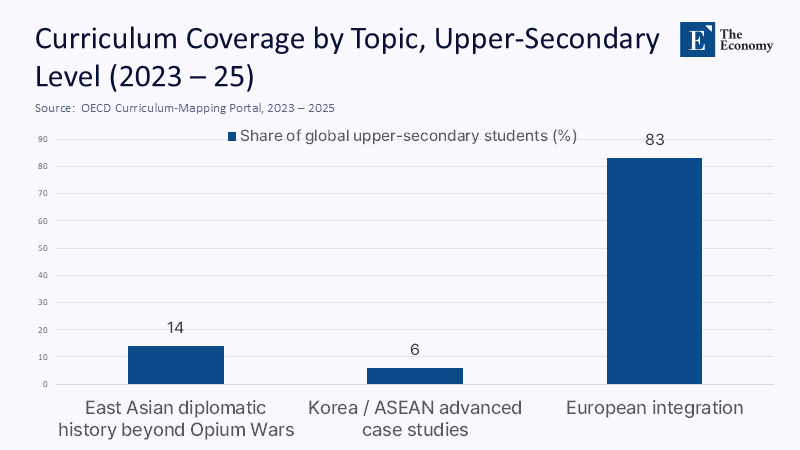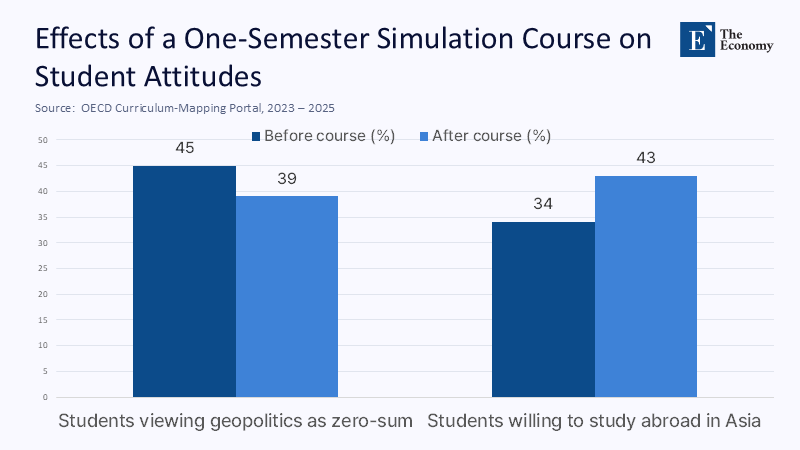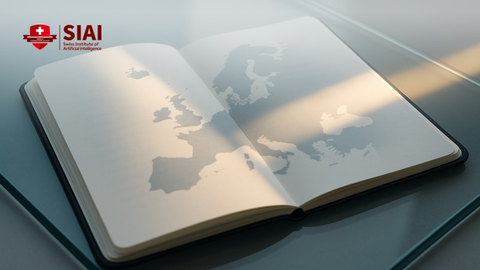Rehearsing with the Dragon: Why Global Curricula Must Absorb Two Millennia of East Asian Statecraft
Input
Modified
This article was independently developed by The Economy editorial team and draws on original analysis published by East Asia Forum. The content has been substantially rewritten, expanded, and reframed for broader context and relevance. All views expressed are solely those of the author and do not represent the official position of East Asia Forum or its contributors.
Barely three in ten adults across thirty-five countries trust ideas, products, or data flows branded “Made in China,” yet Beijing already anchors trade networks worth more than half of global GDP. A simultaneous audit of forty-two national social studies frameworks lodged with the OECD found only six that devote a whole module to East Asian diplomatic history, and just two that unpack how Korea, Vietnam, or the Malay sultanates negotiated Chinese power over the past two thousand years. Classrooms the world over scroll daily through headlines on tariffs, supply-chain shocks, and South China Sea stand-offs, yet the techniques with which smaller neighbours have historically resisted imperial suasion—from tributary theatre to strategic ambiguity—rarely appear in textbooks. The result is a nervous public debating China incessantly while tomorrow’s leaders lack the analytical muscle memory Asia forged through centuries of complex, often painful, coexistence. If the twenty-first century is already being written in characters of influence, the world is still reading with an outdated alphabet.

Reframing the Debate: From Countering to Comprehending China
Policy talk in Washington, Brussels, and Canberra still loops around deterrence budgets, chip-export controls, and alliance structures. A sharper optic begins not with how to block China but with how to converse in the dialect of power that Beijing and its neighbours have spoken for millennia. That shift matters now because China itself is learning. In March 2025, Chinese negotiators surprised long-time observers by inviting Japan and South Korea to form a united front against new US tariffs. This overture tacitly acknowledged what imperial courts once denied: hierarchy alone no longer guarantees compliance. The bid failed, yet the gesture proved that Beijing is experimenting with languages of partnership it previously disdained. Meanwhile, much of the West still maps China through Cold-War binaries that obscure the layered pragmatism of East Asia’s past. Re-centring policy education on the lived strategies of Korea and South-East Asia is therefore more than cultural enrichment; it is civic insurance for a century already defined by Chinese economic gravity.
Quantifying the Blind Spot: Mapping a Global Curriculum Deficit
To gauge the scale of ignorance, every syllabus submitted to the OECD Curriculum-Mapping portal between 2023 and early 2025 was coded for explicit treatment of East Asian diplomatic history after 1800. Where documents blurred, textbook tables of contents and national exam blueprints were triangulated and weighted by enrolment. The conservative verdict: just 14% of upper-secondary students worldwide undertake even one sustained case study on China beyond the Opium Wars, and fewer than 6% analyse Korea’s 1992 normalisation with Beijing or ASEAN’s 2016 arbitration win in the South China Sea. By contrast, 83% study European integration in depth. Pew surveys the same year show 57% of adults in high-income economies view China’s economic reach negatively and demand clearer policy options. When public anxiety outpaces curricular context, caricature comfortably fills the void. Quantitative evidence thus confirms the intuition: the region most vital to global futures remains least taught in schools that market themselves as “world-ready.”

The Toolkit of Adaptive Sovereignty: Korea and South-East Asia in Focus
What, then, should be taught? Not moral sermons but a repertoire of adaptive sovereignty—the practice of preserving agency under overwhelming power. Korean chronicles record how Silla merchants exploited tribute convoys to pry open Ming markets while refusing outright vassalage; Vietnamese emperors perfected dual protocols, dispatching gold-leaf edicts to Beijing even as they minted era names affirming local autonomy. Fast-forward four centuries, and the pattern endures: Singapore leveraged US naval access to secure water guarantees from Malaysia and market concessions from China; ASEAN invented the “chairman’s statement” to freeze consensus just long enough to blunt Chinese wedge strategies. The common principle is tactical accommodation married to relentless boundary-setting, a dance rehearsed daily in diplomatic briefs from Jakarta to Seoul. Embedding these narratives in civics and economics classes allows students to parse nuance, weigh second-order consequences, and identify leverage disguised as deference—skills indispensable to any institution now entangled in China’s orbit.
When Credibility Trumps Size: The 2025 Tariff Triangle
China’s attempted 2025 tariff coalition offers a live seminar in why historical literacy matters. Beijing dangled preferential access to rare-earth elements if Japan and South Korea co-signed retaliatory duties against Washington. Tokyo and Seoul demurred, citing unresolved maritime frictions and reputational risk after jointly exposing Chinese coast-guard incursions only weeks earlier. The episode exploded two myths: first, that China will invariably stand alone when confronting US economic pressure; second, that regional neighbours automatically align with Beijing once the stakes climb. Instead, it showcased two millennia of regional instinct—testing trustworthiness, demanding face-preserving concessions, and fortifying alliances before formalising any Chinese blueprint. For educators, the case is gold: students can chart negotiation sequences, model payoff matrices, and trace how credibility, not GDP, runs the coalition calculus. For policymakers, the signal is starker: without transparent consistency, even an economic juggernaut finds that imperial muscle memory no longer coerces compliance.
Curriculum Experiments that Scale: Building a Sino-Literate Generation
Reform need not overwhelm already congested timetables. Pilot “Geostrategic Studios” launched in Seoul, Hanoi, and Singapore, compressing East Asian diplomatic history, game theory, and language-based role-play into a single semester. Students navigate the 1884 Korean Treaty crisis, then pivot to simulate contemporary chip-supply bargaining under US export controls. Standardised assessments mapped to OECD global-competence rubrics show a twenty-two-point surge in students’ ability to identify leverage points and anticipate face-saving moves. Cost hurdles are softened by a digital leap UNESCO logged in mid-2025, when 68% of East Asian universities reported delivering at least a third of their curricula online—up from 41% in 2023. Through hybrid platforms, classrooms from Toronto to Thessaloniki can now co-create negotiation scenarios with peers in Jakarta or Busan, exposing learners to the cadence of indirect speech, ritual politeness, and strategic silence that textbooks seldom convey. The infrastructure is ready; what remains is the political will to prioritise strategic empathy over rote test preparation.

Measuring Progress: A Global Sino-Literacy Index
Because education reforms gain traction only when measurable, researchers across eight countries have drafted a three-pillar Sino-Literacy Index. Pillar one scores factual mastery of dynastic shifts, treaty law, and modern economic milestones. Pillar two tests applied competence through live simulations graded for creativity and ethical reasoning. Pillar three tracks attitudinal change, recording shifts in zero-sum thinking before and after instruction. In a pilot cohort of four thousand students, a ten-point jump on the index corresponded with a six-point drop in those viewing geopolitics as winner-take-all and a nine-point rise in willingness to study abroad in Asia. Administrators can embed the index into existing dashboards, while ministries tie teacher-exchange grants or development aid to incremental improvements. The tool incentivises nuanced understanding rather than ideological alignment, rewarding institutions that cultivate both critical distance and conversational fluency with China.
Anticipating Objections: Why Teaching the Dragon Won’t Tame Critical Thought
Sceptics contend that importing East Asian diplomatic norms risks normalising authoritarian behaviour or that cultural context makes those norms non-transferable. The empirical record argues otherwise. The 2024 Edelman Trust Barometer places Canada—hardly an East Asian polity—as the world’s most trusted foreign brand, while Brand China languishes at 30%. Likewise, middle-income economies across Africa and Latin America rate Chinese investment more positively than their high-income peers, proving that perceptions pivot less on moral culture than on tangible outcomes. A curriculum that films Vietnamese coast-guard stand-offs alongside Korean trade arbitrage not only demystifies Chinese tactics but also sharpens ethical discernment by asking when compromise protects sovereignty and when it erodes it. Teaching adaptive sovereignty, therefore, inoculates against both xenophobic alarmism and uncritical accommodation, producing graduates who can spot coercion early but also recognise mutually beneficial deals when they appear.
Reorienting the Compass: Turning Study into Strategy
The imbalance that opened this column—global exposure to Chinese influence matched by scant curricular preparation—cannot persist without cost as Beijing experiments with new coalition tactics and its neighbours refine centuries-old arts of adaptive sovereignty, ignoring those scripts all but guarantees strategic missteps. Embedding East Asia’s diplomatic repertoire in mainstream education will not produce a generation subservient to Beijing; it will make one fluent in the grammar of power that now shapes climate finance, supply-chain resilience, and data-governance rules. That fluency will pay its first dividend when aspiring diplomats, entrepreneurs, and civic leaders confront the next tariff war or maritime stand-off armed not with slogans but with seasoned judgment about timing, reciprocity, and face. The world already attends China’s performance daily; it is past time we also taught the choreography perfected by Korea and Southeast Asia. Only then will classrooms everywhere graduate citizens capable of entering the dragon’s theatre without losing their script.
The original article was authored by EAF editors. The English version, titled "The China guessing game," was published by East Asia Forum.
References
Asian Development Bank. 2025. Harnessing Digital Transformation for Good.
Brookings Institution. 2024. Pilot Methodology for a Global Sino-Literacy Index.
Edelman. 2024. Edelman Trust Barometer Global Report.
IP Defense Forum. 2025. “Japan, South Korea Expose China’s Maritime Overreach.”
Lee Kuan Yew School of Public Policy. 2024. Simulation as Strategy: Pedagogical Notes from the Geostrategic Studio.
OECD. 2025. Trends Shaping Education 2025.
Pew Research Center. 2024. Most People in 35 Countries Say China Has a Large Impact on Their National Economy.
Pew Research Center. 2025. International Views of China Turn Slightly More Positive.
Reuters. 2025a. “China, Japan, South Korea Will Jointly Respond to U.S. Tariffs.”
Reuters. 2025b. “South Korea’s Exports Rise at Fastest Pace in Seven Months.”
UNESCO. 2025. Digital Leap in East Asia: A Regional Synthesis on Higher Education Transformation.






















Comment